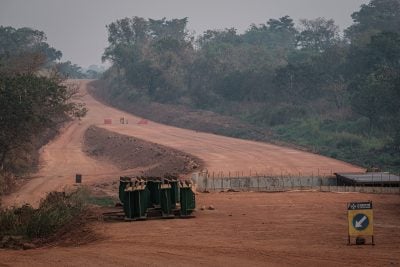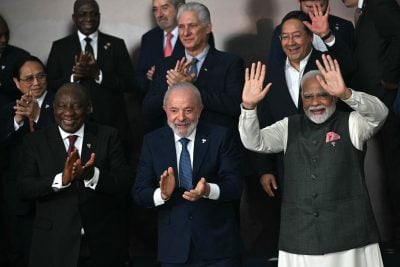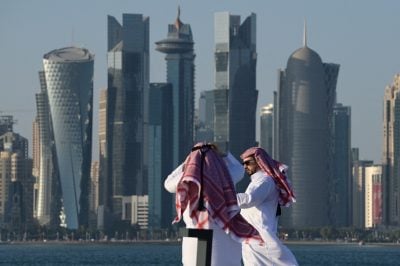Since the beginning of its war in Ukraine, Vladimir Putin’s Russia has renewed efforts to build alliances with African states.
While the West is largely united in its condemnation of Russia’s war, Africa’s responses have been significantly more diverse. Many African countries value historic ties with Russia dating back to the Soviet Union’s backing for anti-colonial liberation struggles. Others see the war in Ukraine as a European sideshow that ought not to limit the continent’s choice of economic partners, and see Western attempts to impose sanctions over a foreign war as hypocritical.
Africa’s diversity of opinion has been shown by votes at the UN critical of Russia, in which African abstentions have played a prominent role.
The Russia-Africa Summit, was thus seen as a chance for Putin to cement his diplomatic gains. In a pre-summit article, he touted growing Russia-Africa trade cooperation – covering $18bn of trade in 2022. He promised to “develop the full spectrum of economic ties with Africa”.
Africa’s grain under threat
But with no end in sight to the war in Ukraine, recent events show the limitations of Russia-Africa relations. Only 17 African leaders, including South Africa’s Cyril Ramaphosa and Ethiopia’s Abiy Ahmed, ultimately attended, many fewer than the 50 originally anticipated.
Organisers blamed Western pressure. But prior to the summit, Russia angered African partners when it cancelled the Black Sea grain deal, a painstakingly brokered international agreement that allowed Ukraine to continue to export food through its Black Sea ports to the world market. The collapse of the deal could lead to attacks on ships plying the Black Sea route, threatening vital grain exports to Africa.
Indeed, some African partners directly criticised Moscow’s move. A senior civil servant in Kenya, which just weeks before had warmly welcomed Russian foreign minister Sergei Lavrov to Nairobi for talks on economic cooperation, hit out at the move. “The decision by Russia to exit the Black Sea Grain Initiative is a stab on [sic] the back at global food security prices and disproportionately impacts countries in the Horn of Africa already impacted by drought,” Korir Sing’Oei, the top civil servant in Kenya’s foreign affairs ministry said in a tweet.
In a terse statement, Africa’s top diplomat, African Union chairperson Moussa Faki Mahamat, regretted the suspension of the Black Sea grain deal and urged the continued delivery of grain and fertilisers from Russia and Ukraine to global markets.
In his pre-summit article, Putin countered that Russia was capable of replacing the Ukrainian grain on “a commercial and free-of-charge basis” given a “record harvest” this year, and also claimed that Russia would engage in “energetic efforts to provide supplies of grain, food products, fertilisers and other goods to Africa”.
No-show for South Africa summit
African countries will be watching those promises closely. But it is not just the collapse of the grain deal that has weighed on ties. For Putin himself, an arrest warrant abroad and a failed Wagner mutiny at home have limited his travel opportunities.
In July it was confirmed that Putin will not travel to South Africa for the BRICS summit. As a signatory to the founding statute of the International Criminal Court, it was widely assumed that South Africa would be obliged to arrest Putin if he arrived in Johannesburg, given that a warrant is outstanding for his arrest on war crimes charges for the unlawful deportation and transfer of children from occupied areas of Ukraine to Russia.
Facing significant legal obstacles, even the obvious warmth of the African National Congress party (ANC) towards Russia was incapable of enabling Putin’s visit. The reality is that while the war in Ukraine continues – with all its negative implications for food security, global economic harmony, and Putin’s diplomatic diary – ties between Russia and Africa are unlikely to flourish in the way that both would wish.
Want to continue reading? Subscribe today.
You've read all your free articles for this month! Subscribe now to enjoy full access to our content.
Digital Monthly
£8.00 / month
Receive full unlimited access to our articles, opinions, podcasts and more.
Digital Yearly
£70.00 / year
Our best value offer - save £26 and gain access to all of our digital content for an entire year!


 Sign in with Google
Sign in with Google 





